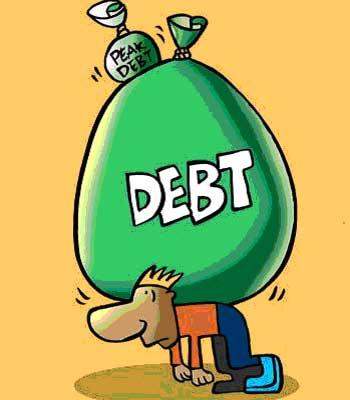
Credit buying is much like being drunk. The buzz happens immediately and gives you a lift. The hangover comes the day after: Joyce Brother
Isn't this so true! Buying on credit is like buying things from your unearned money.
Today, even as the world is trying to grapple with the economic downturn Americans are staggering under near record debt loads. In fact it is common knowledge now that Americans owe 1.5 dollar for every dollar they earn. I am sure no one would like to be in their shoes.
Over-borrowing generally leads to a vicious cycle of interest rates, that is, borrowing to just pay the interest rate: a classic case of a debt trap.
Due to this vicious circle, one ends up paying interest only and the underlying principal remains the same. Who would like to be in such a position? Not me, not you, in fact, not anyone. But individuals do get themselves into such precarious financial positions. There are no excuses, and no wriggling out of this situation. The best course of action in such a situation is to pay off your debts in a systematic way.
Now the most important question is which loan to pay off first? A steady repayment of loan is very important especially for individuals who are in debt trap. This will not only get you out of it but also restore your credit ratings among lenders.
The most common form of loans which most individuals take is:
Every individual would be having some form of loan or the other especially those mentioned above. And if one is over-borrowed then s/he is in trouble.
The author is a certified financial planner and can be reached at dhanplanner@rediffmail.com.
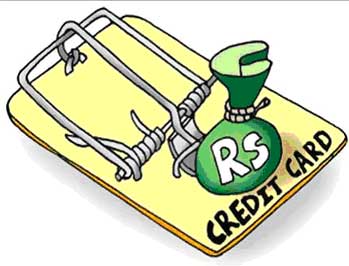
The golden rule is: Start with the one that extracts the highest interest rate amount from your pocket. Paying off the loan with highest interest rate will save you a lot of money.
Going by this golden rule the first loan that you should knock off from your shoulders is the credit card loan.
Indeed, one of the worst forms of borrowings. Credit cards are not bad if used carefully. But do remember to pay your bills on time. Do not roll over your bills or the interest charged can be as high as 3 percent per month. If the amount is not paid in time, you can end up paying an interest of more than 30 percent per annum.
Having more than two credit cards is a big no-no. Do remember to cut your card into two once the outstanding debt is cleared. Credit card is an instrument which tempts an individual to spend beyond her/his limits. So if the temptation still persists and makes you spend then cut all the cards and throw them into the nearest trash bin.
Remember, no more than two cards. Spend within your limits, pay your bills on time and do not carry forward any outstanding amount.
Personal loan
Again due to high rate of interest this loan should be paid off as soon as possible. The average rate of interest is between 14 to 15 percent. Many individuals take personal loans to pay off other loans or for some sort of emergencies. It is advisable to check if you can get loans against your assets like fixed deposits or gold rather than going for personal loans.
If not, only then should you go for a personal loan. And once taken make it a point to retire as quickly as you can.
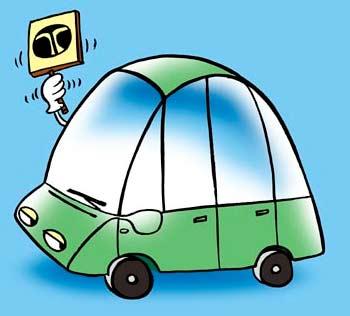
Car loans need to be taken care of with due diligence.
Individuals with business or professionals with their own business can claim exemptions on car loan but salaried employees cannot.
A car loan is an expensive loan and the sooner it is repaid the better. It's advisable to take as small a loan amount as possible. The problem in prepaying the car loan is the prepayment penalty.
At times it can be as high as 5 per cent of the principal amount outstanding. Generally, the interest component is more in the initial years and hence it makes more sense to close the loan in the initial years than in the later years.
Loans from private money lenders
This is again a very famous form of borrowing in India. The interest rates are generally very high. The only reason for me writing this point at this stage is that the private moneylenders can be considerate when it comes to non-payment of interest on time. But again that does not justify borrowing from them and if for any god forsaken reason you end up borrowing from them do make it a point to see their back soon.
As the rate of interest can be as high as 18 per cent per annum, it is again advisable to payoff this loan as soon as possible.
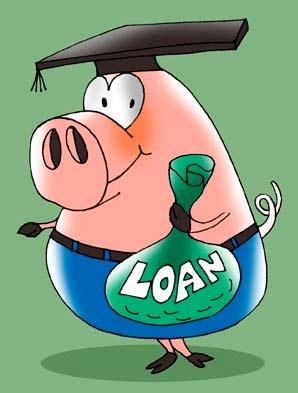
This form of loan can be termed a good loan as it is used to improve your career and your future income-generating capacity.
The other advantage is the interest component can be claimed for tax exemption under section 80E. Make sure that the course for which you are borrowing is useful and will help you secure a good future.
As the loan repayment starts once you finish the course or after the stipulated time ends. Also, you need to keep this in mind that the exemption is only available for eight assessment years.
Home loans
Again a good loan as you can claim exemption on the interest amount you pay to the tune of Rs 1.5 lakh from your gross taxable income as well the principal amount also qualifies for exemption under section 80C up to Rs 1 lakh.
Do remember that if the loan is taken for a longer tenure, say 20 years, then you will end up paying double the amount that you borrowed in the first place.
For example, say you have borrowed Rs 20 lakh at 9 per cent interest per annum for a 20-year tenure. At the end of this tenure you will end up paying Rs 23,18,684 as the interest component. So the total amount you will be paying back is Rs 43,18,684 (Rs 23,18,684 plus Rs 20 lakh, your principal component). And, that too if you are lucky enough for your floating rate of interest to remain same throughout your tenure.
If the interest rate increases, you end up paying more than the figure totted up above.
In the same example, if you take 15-year tenure although your EMI increases, the interest component comes down to Rs 16.51 lakh. Although at the outset if you take longer tenure in order to pay lower EMI every month, it is advisable you prepay as and when possible. So accordingly try to limit your loan amount.
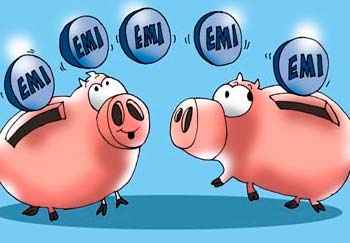
The most important part towards how to pay off your loan is:
Note: Whenever you consider borrowing always remember that you need to check that your total annual debt payments should not be more than 45 per cent of your total annual take-home packet. Also, your total annual non-mortgage payment (that is, payment towards car, personal loan, and any other form of loan besides home loan) should not be more than 15 percent of your total annual take-home pay.
If you stay within this range you will avoid being in trouble. Anything beyond the above mentioned range will put your financial freedom in danger.